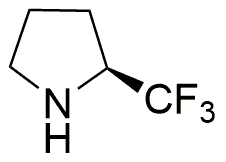(S)-(+)-2-(Trifluoromethyl)pyrrolidine is widely utilized in research focused on:
- Pharmaceutical Development: This compound serves as a key intermediate in the synthesis of various pharmaceuticals, particularly in the development of drugs targeting neurological disorders due to its unique structural properties.
- Agrochemical Formulations: It is employed in the creation of innovative agrochemicals, enhancing the efficacy of pesticides and herbicides by improving their stability and bioavailability in agricultural applications.
- Material Science: The compound is used in the production of advanced materials, such as polymers and coatings, where its trifluoromethyl group imparts desirable properties like chemical resistance and thermal stability.
- Research in Organic Chemistry: It acts as a valuable reagent in organic synthesis, facilitating the formation of complex molecules and enabling researchers to explore new chemical reactions and pathways.
- Fluorine Chemistry Studies: This compound is significant in the field of fluorine chemistry, allowing scientists to investigate the effects of fluorination on molecular behavior and reactivity, which can lead to the development of new materials and compounds.
General Information
Properties
Safety and Regulations
Applications
(S)-(+)-2-(Trifluoromethyl)pyrrolidine is widely utilized in research focused on:
- Pharmaceutical Development: This compound serves as a key intermediate in the synthesis of various pharmaceuticals, particularly in the development of drugs targeting neurological disorders due to its unique structural properties.
- Agrochemical Formulations: It is employed in the creation of innovative agrochemicals, enhancing the efficacy of pesticides and herbicides by improving their stability and bioavailability in agricultural applications.
- Material Science: The compound is used in the production of advanced materials, such as polymers and coatings, where its trifluoromethyl group imparts desirable properties like chemical resistance and thermal stability.
- Research in Organic Chemistry: It acts as a valuable reagent in organic synthesis, facilitating the formation of complex molecules and enabling researchers to explore new chemical reactions and pathways.
- Fluorine Chemistry Studies: This compound is significant in the field of fluorine chemistry, allowing scientists to investigate the effects of fluorination on molecular behavior and reactivity, which can lead to the development of new materials and compounds.
Documents
Safety Data Sheets (SDS)
The SDS provides comprehensive safety information on handling, storage, and disposal of the product.
Product Specification (PS)
The PS provides a comprehensive breakdown of the product’s properties, including chemical composition, physical state, purity, and storage requirements. It also details acceptable quality ranges and the product's intended applications.
Certificates of Analysis (COA)
Search for Certificates of Analysis (COA) by entering the products Lot Number. Lot and Batch Numbers can be found on a product’s label following the words ‘Lot’ or ‘Batch’.
*Catalog Number
*Lot Number
Certificates Of Origin (COO)
This COO confirms the country where the product was manufactured, and also details the materials and components used in it and whether it is derived from natural, synthetic, or other specific sources. This certificate may be required for customs, trade, and regulatory compliance.
*Catalog Number
*Lot Number
Safety Data Sheets (SDS)
The SDS provides comprehensive safety information on handling, storage, and disposal of the product.
DownloadProduct Specification (PS)
The PS provides a comprehensive breakdown of the product’s properties, including chemical composition, physical state, purity, and storage requirements. It also details acceptable quality ranges and the product's intended applications.
DownloadCertificates of Analysis (COA)
Search for Certificates of Analysis (COA) by entering the products Lot Number. Lot and Batch Numbers can be found on a product’s label following the words ‘Lot’ or ‘Batch’.
*Catalog Number
*Lot Number
Certificates Of Origin (COO)
This COO confirms the country where the product was manufactured, and also details the materials and components used in it and whether it is derived from natural, synthetic, or other specific sources. This certificate may be required for customs, trade, and regulatory compliance.


